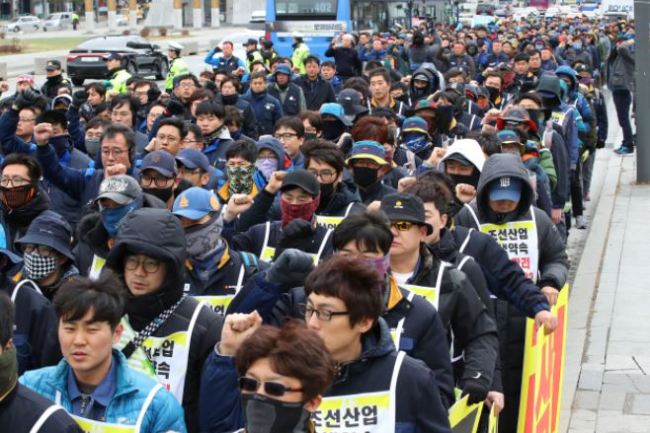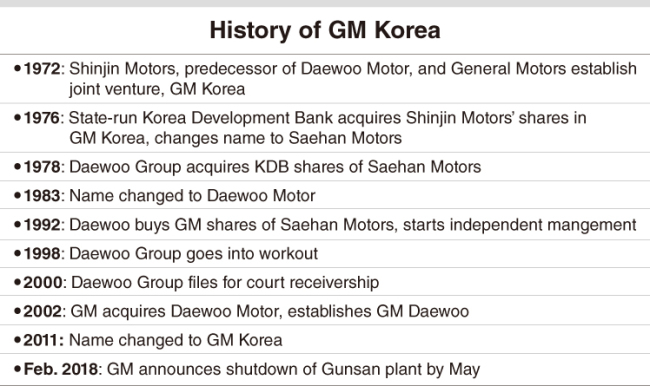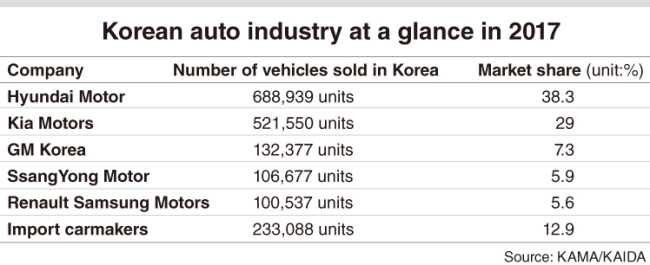[GM Crisis] Militant labor union poured fuel on fire in GM crisis: experts
By Kim Bo-gyungPublished : March 26, 2018 - 17:36
Long after market rumors had circulated of GM Korea’s possible withdrawal from the country, GM headquarters made a decision to shut down the Gunsan plant in North Jeolla Province in February.
The announcement immediately sent shock waves across the local auto industry, which is facing similar hardships, with militant labor unions demanding higher wages despite declining productivity and sales.
The last time Daewoo Motor, the predecessor of GM Korea, was sold in 2002, it was due to the 1997-1998 Asian Financial crisis that had caused Daewoo Group to file for court receivership.

GM Korea’s latest decision largely stems from within, triggered by a militant labor union but apparently motivated by the strategic decisions of the GM headquarters to shift its focus to China and the US.
“The issue of high labor costs and low productivity concerns not only GM Korea but also Korea’s auto industry in general. Unless the cost structure changes, it will be difficult for the country’s auto industry to grow further. The overhaul is in the hands of the labor union,” Lee In-cheol, CEO and economic analyst at Real Good Economic Research Institute, told The Korea Herald.
While the state-run Korea Development Bank will investigate other factors such as excessive costs borne by the Korea unit for research and development, and high interest rates on loans from the headquarters, the labor union has played a major part in bringing about the crisis at GM Korea.

Lee said the absence managerial-level executives at GM Korea that could have promptly reacted to changing local and global market conditions helped bring the local arm of the automaker to crisis point.
Labor unions staging strikes calling for higher salaries, bigger bonuses, and more welfare benefits have long been an annual event here, with wage negotiations dragging on to the following year at times and politicians joining the scene in hopes of catching more votes.
GM Korea posted a cumulative loss of some 3 trillion won between 2014 and 2017, while workers’ average wage rose to a near 90 million won in 2017 from 73 million in 2013.
Workers at GM Korea were paid 86.7 million won on average in 2016 and its labor cost-to-sales ratio was 11.4 percent, according to data by the Korea Automobile Manufacturers Association.
In the cited period, the labor cost-to-sales ratio at Renault Samsung Motor was about one-third of GM’s, at 4.4 percent, where workers received an average wage of 65.5 million won.
Under a militant union, GM Korea workers staged partial strikes for 17 days last year, affecting the production of 11,000 vehicles. It had also faced delays on 15,000 units caused by 14 day strikes in 2016, the company said.

While net losses at GM Korea snowballed to 631.5 billion won in 2016 from 333.2 billion in 2014, GM workers had received over 10 million won in annual bonuses, according to the FSS.
At neighboring Hyundai and Kia Motors, which have stronger labor unions, the degree of damage caused by strikes has been even greater.
According to Hyundai, 24 day strikes staged in 2016 had affected 142,000 vehicles and caused 3.1 trillion won in losses.
This had caused Hyundai’s partner companies about 90 billion won in losses per day, according to the Korea Federation of SMEs.
Amid the continued standoff between GM Korea and the labor union, the cash-strapped firm’s due date for voluntary resignations and loans worth 2.3 trillion won is approaching next month.
GM Korea is expected to hold the 7th round of wage talks with the union Tuesday.
The rumors of GM Korea’s withdrawal for years had not been without basis.
Sales of GM Korea dropped 12.2 percent on-year to 524,547 units -- 132,377 units here and 392,170 units overseas -- in 2017.
Last year’s performance is a 33 percent drop compared to some 780,000 units sold in 2013, when GM carried out its Europe exodus, ultimately slashing GM Korea’s exports, the company said.
Hinting at the possibility of GM Korea’s pullout due to increasing labor costs, in 2013 then GM chief Daniel Akerson had told former President Park Geun-hye that Korea had to address pay regulations before the company could make additional investments here.
“If the Gunsan plant was an attractive production base, other companies would have been after it, but as for now no one’s willing to buy it,” said Yang Jun-sok, professor of economics at Catholic University of Korea.
“Cooperation from the labor union is vital to cut down on production costs. If not, I believe GM will gradually close the Bupyeong and Changwon factories.”
Going a step further, Lee forecast that GM would exit Korea due to pressure from US government. By Kim Bo-gyung (lisakim425@heraldcorp.com)




![[Herald Interview] 'Amid aging population, Korea to invite more young professionals from overseas'](http://res.heraldm.com/phpwas/restmb_idxmake.php?idx=644&simg=/content/image/2024/04/24/20240424050844_0.jpg&u=20240424200058)














![[Today’s K-pop] Kep1er to disband after 2 1/2 years: report](http://res.heraldm.com/phpwas/restmb_idxmake.php?idx=642&simg=/content/image/2024/04/25/20240425050792_0.jpg&u=)